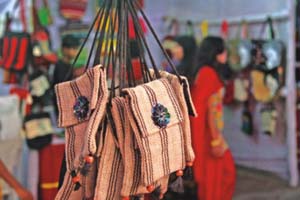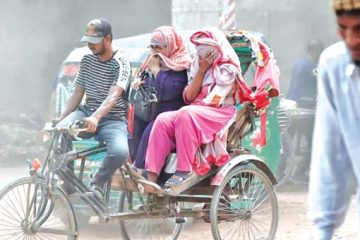Md Rashedul Karim Munna
 Global consumer demand for eco-friendly products has increased in both developed markets (such as Western Europe, the United States and Australasia) as well as new markets with emerging opportunities (such as the Middle East) mainly because of heightened awareness of the ill effects of environmental pollution and global warming.
Global consumer demand for eco-friendly products has increased in both developed markets (such as Western Europe, the United States and Australasia) as well as new markets with emerging opportunities (such as the Middle East) mainly because of heightened awareness of the ill effects of environmental pollution and global warming.
Large chain stores are also offering alternate bags made of jute or cotton. This proves there is healthy global demand for these products due to the growing awareness of and demand for eco-friendly and biodegradable products.
Walter H Deubner invented the first packaging bag and by 1915, he was selling over a million shopping bags a year. The lightweight shopping bag that we see today dates back to the 1960s. From the mid-1980s, the use of plastic bags became common. Plastic bags soon replaced paper bags.
However, in May 2003, South Africa set the pace by banning thinner plastic bags as well as imposing levies on the thicker ones. Eritrea, Rwanda and Somalia banned plastic bags in 2005. Tanzania (including Zanzibar) introduced a total ban on the carriers in 2006. Kenya and Uganda in mid-2007 banned thinner plastic bags and imposed levies on thicker ones.
In 2002, Bangladesh imposed an outright ban on all thinner plastic bags in Dhaka after they were found to have choked the drainage system during devastating floods. The measure triggered a revival of the local jute bag industry. In India, Mumbai banned plastic bags in 2000 and the Himalayan state of Himachal Pradesh made thinner bags illegal in 2003.
Taiwan banned free lightweight plastic bags in March 2003. China, whose consumers use 3 billion plastic bags a day, announced in January 2008 it would ban shops from handing out free plastic bags from June 2008, and make production of ultra-thin carriers illegal. The announcement led to closure of China’s largest plastic bag factory.
In the US, San Francisco became the first city to ban plastic bags from large supermarkets and pharmacies in March 2007. Several months later the rest of California passed laws requiring large supermarkets to take back and recycle plastic bags.
But why opt for jute shopping bags? Jute bags are more robust and durable and these bags are quite cheap compared to cotton fabric of similar weight. Moreover it is a natural plant fibre that is a renewable and sustainable resource. Jute promotional bags work well for concept stores that have products that are earth friendly.
Additionally, jute production supports a huge number of small farming communities. According to Prime Minister Sheikh Hasina (as quoted from The Financial Express; April 21 2010), “About 30 million people are directly or indirectly dependent on the jute sector as 3.5 million farmers are engaged in growing jute, 0.2 million people are working in jute factories, 0.1 million are engaged in jute trade, and a large number of people provide other related services.” Also, jute plants consume carbon dioxide — the main cause of the greenhouse effect.
It has been estimated that annual world demand for shopping bags is 500 billion pieces. Leading food retailers Tesco, the Co-operative Group, Sainsbury’s, Morrisons and the John Lewis-Waitrose partnership are expanding grocery convenience formats. In the UK alone, the grocery market was worth £150.8 billon in 2010, an increase of 3.1 percent from 2009.
By 2014, IGD (a research organisation dedicated to the development of the food and grocery industry) predicts that the Chinese grocery market will be worth about $1.046 trillion at today’s rates, compared to a forecast US market value of $1.024 trillion.
Demand for natural, biodegradable bags will gradually increase as more and more chain shops around the world phase out the use of polythene bags and use bio-friendly natural fibre bags instead. Thus the potential market for jute shopping bags is enormous.
Jute goods manufacturers in Bangladesh export around 100,000 shopping bags a month on average to different countries. They mention that there is scope for more shipments over the coming years as some European countries are set to ban polythene bags. So far, demand has well exceeded estimates.
As per industry estimates, India had exported about 40 million jute bags mainly to Europe in 2008-09 and the number is likely to cross 75 million by 2011-12. It also reported that Sushil Khetan, president of Association of Jute and Handicrafts Entrepreneurs of Eastern India, has said India’s export of jute bags in 2008-09 is estimated at Rs 200 crore, while it was Rs 120 crore in the previous year.
However, there are problems too for the Bangladesh exporters. For instance, jute fibre and ultimately jute fabric prices are not stable and when compared to cotton fabric, the price of the jute fabric is high. This is because of the weight of the fabric, which is heavier than cotton fabric.
Moreover, the supporting processes such as wet process and lamination have not expanded for the jute sector and thus the cost of such processes remain high. Also a lack of adequate and/or skilled workforce hampers the sector.
To solve our problems, technological improvements are a must. If the fabric could be made lighter and softer, customers would feel more comfortable in using these bags and reuse could increase. Up-gradation in additional or supporting processes could make these processes cheaper and thus aid in making the final price of the bag less expensive. Moreover, improving human resources and creating a skilled workforce is essential if this industry is to take advantage of growing global demand.
Assistance should be provided for raw material improvements and cost effectiveness (such as reducing taxes for import of modern machines). The Jute Commission’s preliminary report suggesting that the government “declare the jute sector an ‘agro-based industry’, having provisions of fiscal support with other required facilities as given to other existing agro-sector industries in the country” should be implemented as soon as possible. This will persuade farmers to grow more jute and thus stabilise jute price to some extent. The National Jute Policy should also be finalised soon.
Already due to consumer demand, there is an increasing number of jute bag manufacturers, making it easier and more affordable to make the switch to eco-friendly shopping bags for both international and domestic customers. The future of the jute industry is particularly bright.
Due to its eco-friendly and biodegradable characteristics, it is safe to say it will continue to keep its global presence. We can also safely assume that a thriving jute bag sector will help to employ another 1.5 million people, directly or indirectly, in Bangladesh.
The wide range of jute diversified products, especially jute shopping bags, can bring in much needed foreign exchange particularly at this point of time when the reserve is fast depleting. We can estimate that around Tk 500-700 crore can be earned within the next five years.
(Article originally published on The Daily Star)
The writer is managing director of Creation Private Ltd.







